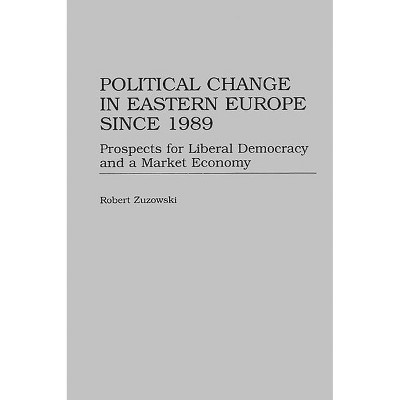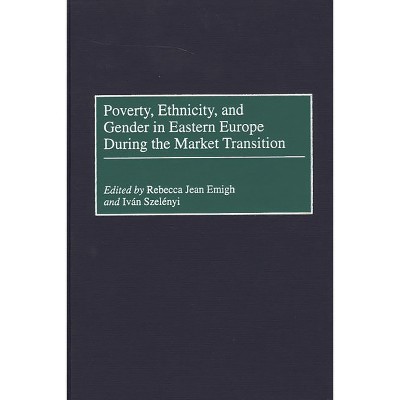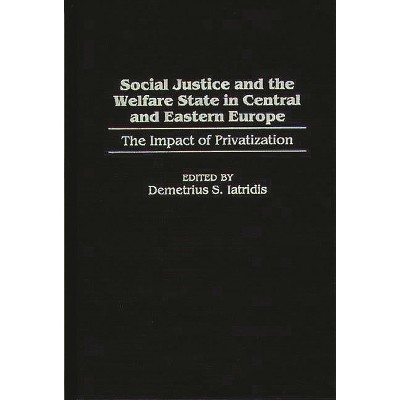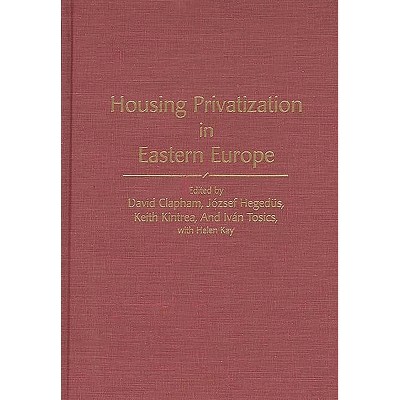Sponsored

Change in Eastern Europe - by Robert Weiner (Hardcover)
In Stock
Sponsored
About this item
Highlights
- The Revolutions of 1989 were a surprise to Kremlinologists because their models of change overestimated the staying power of ruling communist elites; at the same time civil society was able to form alternative political cultures which undermined the legitimacy of the socialist order.
- About the Author: ROBERT WEINER is Professor of Political Science at the University of Massachusetts, Boston, and a Fellow at the Russian Research Center, Harvard University.
- 192 Pages
- Social Science, Anthropology
Description
About the Book
The Revolutions of 1989 were a surprise to Kremlinologists because their models of change overestimated the staying power of ruling communist elites; at the same time civil society was able to form alternative political cultures which undermined the legitimacy of the socialist order. The Revolutions were the result of a prolonged systemic crisis of communism, combined with the unwillingness of Gorbachev to use force to maintain the Eastern European rulers in power. Civil society lost its fear of the repressive apparatus of the communist system as the ruling elites became increasingly disunited as to how to best respond to the crisis. After the Revolutions, other surprises were in store as the transition unfolded and the process of democratic consolidation encountered unanticipated obstacles.
Weiner details these issues in one of the most up-to-date examinations of change in East Europe. After reviewing the history of the region and the imposition of communism, he analyzes the collapse of communism and the efforts to create stable alternatives country-by-country. In addition, he examines models of change and the foreign policies of the region. An indispensable guide to the area that will be of value to political scientists and others concerned with contemporary Eastern Europe.
Book Synopsis
The Revolutions of 1989 were a surprise to Kremlinologists because their models of change overestimated the staying power of ruling communist elites; at the same time civil society was able to form alternative political cultures which undermined the legitimacy of the socialist order. The Revolutions were the result of a prolonged systemic crisis of communism, combined with the unwillingness of Gorbachev to use force to maintain the Eastern European rulers in power. Civil society lost its fear of the repressive apparatus of the communist system as the ruling elites became increasingly disunited as to how to best respond to the crisis. After the Revolutions, other surprises were in store as the transition unfolded and the process of democratic consolidation encountered unanticipated obstacles.
Weiner details these issues in one of the most up-to-date examinations of change in East Europe. After reviewing the history of the region and the imposition of communism, he analyzes the collapse of communism and the efforts to create stable alternatives country-by-country. In addition, he examines models of change and the foreign policies of the region. An indispensable guide to the area that will be of value to political scientists and others concerned with contemporary Eastern Europe.Review Quotes
?Many of his distinctions are well taken, notably that between East Central European areas ( he does not deal with the former USSR) once penetrated by the Ottomans and more northerly countries. This Praeger hardcover edition could be a handy supplement for students wishing to update the coverage of excellent analytic textbooks like Ivan Volgyes' politics in Eastern Europe(1986).?-Journal of Baltic Studies
"Many of his distinctions are well taken, notably that between East Central European areas ( he does not deal with the former USSR) once penetrated by the Ottomans and more northerly countries. This Praeger hardcover edition could be a handy supplement for students wishing to update the coverage of excellent analytic textbooks like Ivan Volgyes' politics in Eastern Europe(1986)."-Journal of Baltic Studies
About the Author
ROBERT WEINER is Professor of Political Science at the University of Massachusetts, Boston, and a Fellow at the Russian Research Center, Harvard University. Among his earlier publications are Romanian Foreign Policy and the United Nations (Praeger, 1984) and a contribution to Foreign Policies of Eastern Europe (Praeger, 1980). He has also published articles in Sudost Europa, The East European Quarterly, Orbis, and Current Politics and Economics of Russia.Shipping details
Return details
Trending Non-Fiction

















